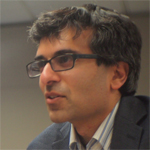
Yurchanka Siarhei / shutterstock.com
ATLANTA—The increasing ease and the lowering cost of genome and exome sequencing make discovery and diagnosis of rare diseases more feasible than ever, but hurdles still need to be cleared before the world of medicine can fully harness the power of this information boom, experts said in a session at the 2019 ACR/ARP Annual Meeting.
Chip Chambers, MD, former chief of endocrine surgery at Vanderbilt University, Nashville, Tenn., said his two children were diagnosed with deficiency of adenosine deaminase 2 (DADA2) in 2014. The first two articles1,2 describing the disease were published that year—and since then he has worked to improve awareness and promote research for better treatment of the disease, founding the DADA2 Foundation. He also continues to hold his clinical faculty appointment at Vanderbilt, and he operates and teaches residents at the Veterans Affairs Medical Center.
Need for Faster Progress
Half of people with rare diseases are children, and 30% of them won’t reach their 5th birthday, Dr. Chambers said. The need for faster progress is obvious, he stressed.
“How can progress be made in a time frame that’s a lot shorter than we’re accustomed to?” he said. “We shouldn’t be okay with the pace that we’re on related to rare diseases. … It’s just unacceptable to me as a physician that 95% of these rare diseases don’t have an FDA-approved treatment.”

Dr. Chambers
Rather than the traditional linear approach that research and development often takes, in which one group discovers a disease, publishes on it and then has conversations about future work on it before life “gets in the way,” Dr. Chambers called for a nonlinear, web-based approach, incorporating patient registrations, fundraising, scientific collaborations and global connections.
Crucial, he said, is empowering patients and listening to their concerns with genuine curiosity.
“If we empower patients earlier on to take the next step, they are naturally curious,” Dr. Chambers said. “If we keep in touch with them and we coach them to ask the right questions, and we get them involved in the research early after a rare disease is discovered, that will help guide their natural curiosity.”
He added, “This new approach is going to make you uncomfortable—can challenge the norms of our profession—but what might it do for the greater science and medical community? More important, what might it do for the patients?”
Dr. Chambers urged clinicians to ask these questions of themselves: “Who is your one in 30 million patient? What is the next question you need to ask? How can your patients fuel this work with you?”


